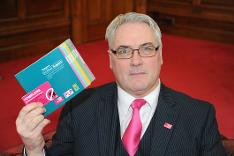- Glasgow City Council
- > News Archive
- > News Archive 2017
- > March 2017
- > City's Poverty Leadership Panel targets low income families and homeless with support information
City's Poverty Leadership Panel targets low income families and homeless with support information

The Poverty Leadership Panel (PLP) has launched In Work Support (IWS) and a pocket sized information card for two of its priority groups when tackling poverty.
The first, In Work Support, is mainly an online resource to support those in low paid jobs and low income families who, despite being in employment, still suffer financial hardship.
The second, the homelessness easement card, as it's become known, is aimed at unemployed homeless individuals who could be missing out on welfare payments or being unfairly categorised for benefits or Job Seekers Allowance (JSA) because they have wrongly or mistakenly stating their housing situation.
In-Work Support provides a range of information, in one single place, to help those on low incomes and with families to support to find out about further financial assistance and benefits available to them.
With figures showing that the number of families still living in poverty where at least one family member works has steadily increased, in Glasgow and Scotland, over twenty years, the guide (available in hard copy and online at www.glasgow.gov.uk/iws) includes information on benefits entitlement once in employment, help with travelling costs, further training, saving for unexpected financial shocks and on leading healthier lifestyle.
The idea for the resource was raised at a Work and Worth workshop, run by the PLP, where participants discussed the need for continued support once finding a job and lack of awareness of what services were out there to help.
The homelessness easement card, was created to overcome the challenge of welfare benefit claimants mistakenly failing to tell work coaches during meetings that they are homeless and falling into the Universal Credit process in error that can lead to sanctions and take a period of time to rectify. The card aims to explain being homeless can mean many things, not just rough sleeping, and it is important to tell Job centre staff if you are in this situation.
The simple pocket sized card was designed with the help of council, Department for Work and Pensions staff and homeless clients themselves, some of whom did not categorise themselves as homeless because they were living in a homeless unit, bed and breakfast or sofa surfing.
Importantly they may also be missing out on the possibly of having an easement applied to their claim - a discretionary power Job centre staff can use to change what is expected of new JSA claimants who are homeless and sleeping rough or in certain some kinds of supported accommodation.
Staff and work coaches have been trained to recognise the cards and provide support and apply homeless easement which puts the focus on finding accommodation before and accessing other support.
The cards also carry a message on Glasgow's libraries with free access to books, computer classes and electoral registration as homeless individuals living in temporary accommodation can still register to vote.
Both resources have been developed by members of the PLP, including Community Activist Panel members and Glasgow City Council, Department for Work and Pensions, Money Advice Service and further education colleges. Glasgow City Mission and their service users were also instrumental in helping to support the design and distribution of the homelessness cards.
Councillor Frank McAveety, co-chair of the Poverty Leadership Panel, said: "In creating this bank of In Work Support information, in a single place, we want people to know that help doesn't just stop when you find a job.
"Gaining employment is a positive move and there is additional assistance out there to make being in employment worthwhile, not just financially but in terms of improving wellbeing and participating in society.
"However, for some, the priority should first and foremost about finding somewhere to stay before taking on the challenge of finding employment. Hopefully this card will help overcome some of the challenges that many homeless people face in claiming welfare payments and finding work. "
Speaking about the In Work Support resource Robin Ashton, Executive Director of Glasgow College's Regional Board, said "Glasgow's colleges are committed to improving the economic and social well-being of city residents, and resources such as this play an important role in supporting participation in lifelong learning and ensuring that personal development doesn't stop when employment starts.
"This guide signposts a range of flexible learning opportunities, most provided free to those on a low income, helping people further develop their skills for learning, life and work, to progress in their careers and fulfil their potential in life".
The work of the Poverty Leadership Panel looks at number of issues around having no money, including the impact on health, social exclusion and the effect on people's confidence and aspirations.
PLP partners are working hard on a range of measures to make poverty and financial exclusion is a thing of the past including mitigating welfare reform, encouraging benefits uptake and supporting projects that foster responsible management of money. More information www.povertyleadershippanel.org
It particularly focuses on the most vulnerable groups in our society, in terms of at risk of being in or falling into poverty including pensioners, ethnic minorities, those with disabilities and lone parent families.





